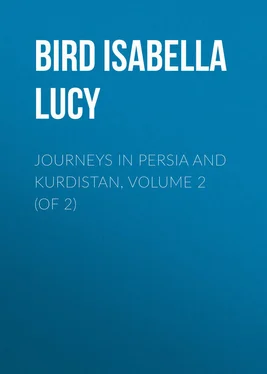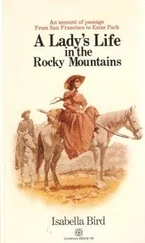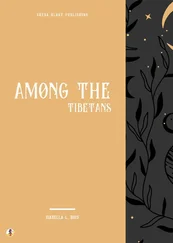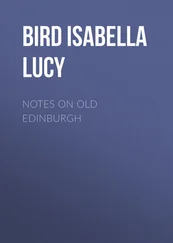Isabella Bird - Journeys in Persia and Kurdistan, Volume 2 (of 2)
Здесь есть возможность читать онлайн «Isabella Bird - Journeys in Persia and Kurdistan, Volume 2 (of 2)» — ознакомительный отрывок электронной книги совершенно бесплатно, а после прочтения отрывка купить полную версию. В некоторых случаях можно слушать аудио, скачать через торрент в формате fb2 и присутствует краткое содержание. ISBN: , Жанр: foreign_language, foreign_antique, foreign_prose, Путешествия и география, на английском языке. Описание произведения, (предисловие) а так же отзывы посетителей доступны на портале библиотеки ЛибКат.
- Название:Journeys in Persia and Kurdistan, Volume 2 (of 2)
- Автор:
- Жанр:
- Год:неизвестен
- ISBN:http://www.gutenberg.org/ebooks/38828
- Рейтинг книги:5 / 5. Голосов: 1
-
Избранное:Добавить в избранное
- Отзывы:
-
Ваша оценка:
- 100
- 1
- 2
- 3
- 4
- 5
Journeys in Persia and Kurdistan, Volume 2 (of 2): краткое содержание, описание и аннотация
Предлагаем к чтению аннотацию, описание, краткое содержание или предисловие (зависит от того, что написал сам автор книги «Journeys in Persia and Kurdistan, Volume 2 (of 2)»). Если вы не нашли необходимую информацию о книге — напишите в комментариях, мы постараемся отыскать её.
Journeys in Persia and Kurdistan, Volume 2 (of 2) — читать онлайн ознакомительный отрывок
Ниже представлен текст книги, разбитый по страницам. Система сохранения места последней прочитанной страницы, позволяет с удобством читать онлайн бесплатно книгу «Journeys in Persia and Kurdistan, Volume 2 (of 2)», без необходимости каждый раз заново искать на чём Вы остановились. Поставьте закладку, и сможете в любой момент перейти на страницу, на которой закончили чтение.
Интервал:
Закладка:
The whole village of Kalahoma was out, thronging, pressing, and almost suffocating me, and the Khan's servants who came to meet me did not or could not disperse the people, though every man holds his life at the Khan's disposal. These villages, which are surrounded by opium fields, are composed of the rudest of human habitations, built of rough stones, the walls being only five feet high. There is much subterranean room for cattle. The stacks of such winter fodder as celery and Centaurea alata , and those of kiziks for fuel, are larger than the dwellings. The latter are of conical form, and many of them are built on the house roofs.
Taimur Khan's fort and serai are in the midst of all this, and are very poor and ruinous, but the walls are high, and they have a balakhana . As I approached the ladies came out to meet me, veiled in white cotton chadars . The principal wife took my hand and led me through a hole in the wall, not to be called a doorway, into a courtyard littered with offal and piled with stacked animal fuel, and up some high dilapidated steps, into a small dark room, outside of which are a very small "lobby" and a blackened ladder against the wall, leading to the roof, on which the ladies sleep in the hot weather. Some poor rugs covered the floor, and there were besides some poor cotton-covered bolsters. Everything, even the dress of the ladies, indicated poverty. The dark hot room was immediately packed with a crowd of women, children, and babies, all appallingly dirty. It was a relief when the Khan was announced in the distance, and they cleared out like frightened sheep, leaving only the four wives, who stood up at his approach, and remained standing till he was seated.
No "well-bred" Khan would pay me a visit in his andarun without sending first with his "homage" to know if I would receive him, nor did Taimur Khan violate this rule or the other of remaining standing until I asked him to be seated. He is a tall, very melancholy-looking man, with a Turkish cast of face, and is dressed in the usual Persian style. After a few ordinary commonplaces he talked politics and tribal affairs, apparently frankly, but who can say if truthfully? He knows that I have letters from the Prime Minister, and he hoped that I might do him some good at Tihran. As soon as important subjects superseded trifles, the wives relapsed into complete indifference, and stared into vacancy.
His tribe, the Magawe, is estimated at 500 families, and has been powerful. Taimur Khan is a staunch adherent of the Ilkhani, but at this point there is a change as to the tribute, half of which is paid to the Ilkhani and half to the Governor of Burujird. He has many grievances, and complains most bitterly that he and his tribe are being ground into poverty by exactions which, he asserts, have this year raised the tribute from 700 to 4000 tumans .
He asks me to do something to help him, adding that his house is in ruins, and that he is so oppressed that he cannot build a new one, or have any surroundings suitable to his rank. I said that I could only send his statements to the British "Vakil" in Tihran, and he at once asked how many horses he should present him with. I replied that the "Vakil" would not accept anything, and that he had lately declined a superb diamond setting in which the Shah desired to send him his picture. The Khan raised his hands, with the exclamation "God is great!"
Isfandyar Khan and Taimur Khan were at war some years ago, and fought from mountain to mountain, and Taimur Khan was eventually captured, taken to Burujird, and sent to Isfahan, where he was kept in irons for some years, the redoubtable Aziz Khan being one of his captors. This accounts for the disappearance of Aziz on "pilgrimage" to a neighbouring imamzada , and the consequent dulness of the camp.
Among a people at once simple and revengeful, it is not unlikely that such severities may bear their legitimate fruit if an occasion presents itself, such as the embroilment of Persia with any other power. Another Khan who was thrown into prison and irons by the Zil-es-Sultan expressed himself strongly on the subject. "Five years," he said, holding out his muscular wrists, on which the marks of fetters are still visible, "I wore the chains. Can I forget?" The Bakhtiaris do not love the Persians, and are held, I think, by a brittle thread.
I have written of the extreme poverty of the surroundings of the Khaja Taimur or Taimur Khan. It is not a solitary instance. Throughout this journey I am painfully impressed with the poverty of the tribesmen. As compared with the wealth of those farther south when visited by Sir A. H. Layard and the Baron de Bode, their condition is one of destitution. The Ilkhani and Ilbegi have fine studs, but few of the Khans have any horses worth looking at, and for some time past none at all have been seen except a few belonging to the chiefs, and the men either walk or ride very small asses.
Their cattle are few and small and their flocks insignificant when compared with those of the Arab tribes west of the Tigris. Their tents and furnishings are likewise extremely poor, and they live poorly, many of them only able to procure acorn flour for bread, and this though they grow a great deal of grain, and every yard of land is cultivated if water is procurable.
The hospitality which those two travellers mention as a feature of the character of the more southerly Bakhtiaris does not exist among these people. They have, in fact, little to be hospitable with. They all speak of better days in the times of their fathers, when they had brood mares and horses to ride, much pastoral wealth and plenty of roghan , and when their women could wear jewels and strings of coins.
On this point I believe them, though there may possibly be exaggeration in Taimur Khan's statements. Persia has undoubtedly tightened her grip upon them, and she is sucking their life-blood out of them. This becomes very evident now that we have reached a point where the government of Burujird comes in, with the infinite unrighteousness of Persian provincial governors. It is not the tribute fixed by the Amin-es-Sultan which these Khans complain of, but the rapacious exactions of the local governors.
There is a "blood feud" between Taimur Khan and Aslam Khan, the chief of the Zalaki tribe, on whose territory we shall enter to-day. A nephew of Taimur killed a relation of Aslam, and afterwards Taimur sheltered him from legitimate vengeance. Just now the feud is very active, and cattle-lifting and other reprisals are going on. "Blood feuds" are of three degrees, according to the nature of the offence. In the first a man of the one tribe can kill a man of the other wherever he finds him. In the second he harries his cattle and goods. In the third he simply "boycotts" him and refuses him a passage through his territory. The Bakhtiaris have often been called "bloodthirsty." I doubt whether they are so, though life is of little account, and they are reckless about spilling blood.
They have a great deal of family devotion, which in lesser degree extends to the members of their tribe, and a Bakhtiari often spares the life of a man who has aggrieved him owing to his fear of creating a blood feud, which must be transmitted from father to son, and which must affect the whole tribe. As a deterrent from acts of violence it acts powerfully, and may account for the singular bloodlessness of some of the tribal fights. Few men, unless carried away by a whirlwind of fury, care to involve a tribe in the far-reaching consequences alluded to, and bad as the custom of blood feuds is, I think there can be no doubt that it acts as a curb upon the passions of these wild tribesmen. "There is blood between us and them," is a phrase often heard.
Punishments are simple and deterrent, well suited to a simple people. When a homicide is captured he is handed over to the relatives of the slain man, who may kill him, banish him, fine him, or pardon him. In point of fact, "blood-money" is paid to the family of the deceased person, and to save his life from their vengeance a homicide frequently becomes a mendicant on the other side of the mountains till he can gain the required sum. Moslem charity responds freely to a claim for alms to wipe out a blood stain. The Ilkhani has a right to fine a homicide. "Blood for blood" is a maxim very early inculcated.
Читать дальшеИнтервал:
Закладка:
Похожие книги на «Journeys in Persia and Kurdistan, Volume 2 (of 2)»
Представляем Вашему вниманию похожие книги на «Journeys in Persia and Kurdistan, Volume 2 (of 2)» списком для выбора. Мы отобрали схожую по названию и смыслу литературу в надежде предоставить читателям больше вариантов отыскать новые, интересные, ещё непрочитанные произведения.
Обсуждение, отзывы о книге «Journeys in Persia and Kurdistan, Volume 2 (of 2)» и просто собственные мнения читателей. Оставьте ваши комментарии, напишите, что Вы думаете о произведении, его смысле или главных героях. Укажите что конкретно понравилось, а что нет, и почему Вы так считаете.












